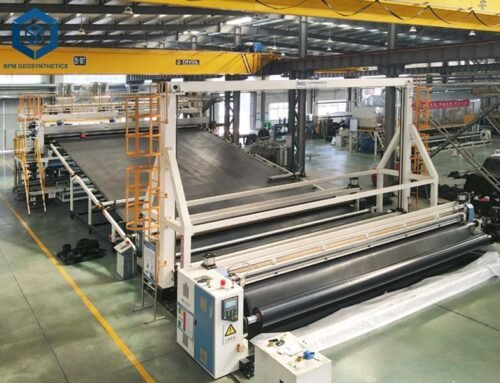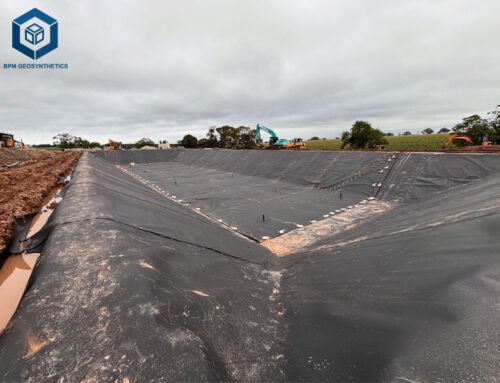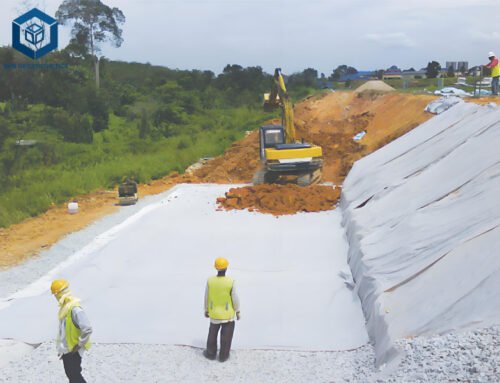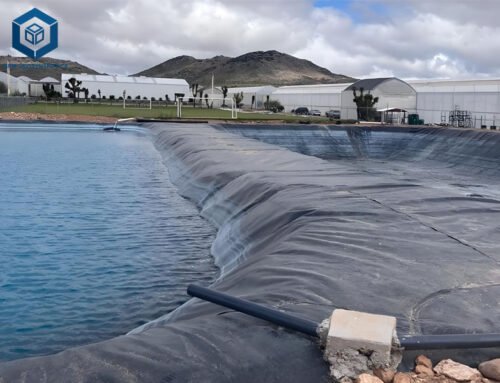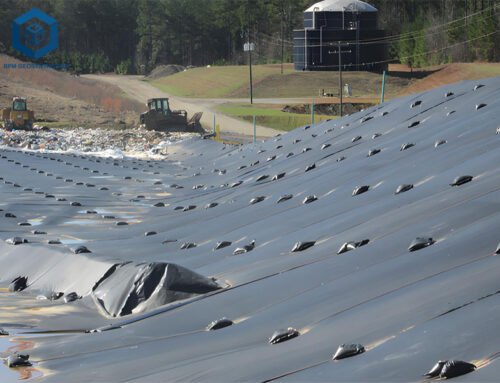Geotextiles are essential geosynthetic materials used in civil engineering, environmental, and construction projects to enhance soil stability, provide erosion control, and facilitate drainage. These geotextile permeable fabrics, typically made from synthetic polymers like polypropylene or polyester, play a critical role in applications such as road construction, landfills, coastal protection, and water management. Selecting the right geotextile manufacturer is vital for ensuring durability, performance, and cost-effectiveness in demanding environments. According to a 2023 market report, the global geosynthetics market is projected to reach $13.2 billion by 2027, driven by infrastructure development and environmental regulations. This comprehensive guide explores the top seven global geotextile manufacturers, with a focus on The Best Project Material Co., Ltd. (BPM Geosynthetics) , providing detailed specifications, parameters, and insights to help you choose the best supplier for your project needs.
1. Why Choosing the Right Geotextile Manufacturer Matters
Geotextiles operate in challenging conditions, exposed to soil, water, and environmental stressors that demand high durability and performance. A reliable manufacturer delivers geotextiles with superior tensile strength, permeability, and resistance to chemical and biological degradation. The right choice ensures project longevity, compliance with regulations, and cost savings. Key considerations include:
- Material Quality: High-quality polypropylene or polyester ensures durability and resistance to UV, chemicals, and biodegradation.
- Performance Specifications: Tensile strength, permeability, and puncture resistance must align with project requirements.
- Certifications and Standards: ISO 9001, ISO 14001, and ASTM compliance ensure quality and reliability.
- Innovation and Customization: Manufacturers investing in R&D offer tailored solutions for specific applications.
- Global Reach and Support: A worldwide presence ensures timely delivery and technical assistance.
- Cost-Effectiveness: Balancing quality and affordability is critical for project budgets.
This article highlights seven leading manufacturers excelling in these areas, offering detailed profiles and technical data to guide your decision-making.
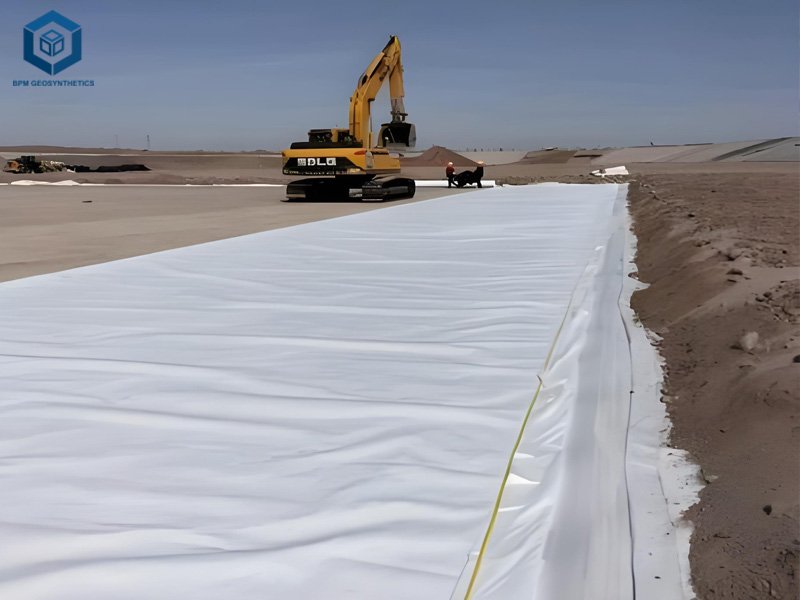

2. Top 7 Global Geotextile Manufacturers
2.1 Global Geotextile Manufacturers – The Best Project Material Co., Ltd. (BPM Geosynthetics)
Overview
The Best Project Material Co., Ltd. (BPM Geosynthetics), established in 2007 and based in Taian, Shandong, China, is a leading manufacturer of geotextiles and geosynthetics. A member of the International Geosynthetics Society (IGS) and China Technical Association on Geosynthetics (CTAG), BPM operates a 26,000-square-meter factory with over 150 professionals. Exporting to 81 countries, BPM is known for its high-quality, innovative geotextiles and comprehensive installation services. Their annual output value exceeds 200 million CNY, making them one of China’s largest geotextile exporters.
Key Products and Specifications
BPM offers a wide range of geotextiles for civil, environmental, and industrial applications, including:
Filament Non-Woven Geotextile:
- Material: Polyester (PET) continuous filament
- Tensile Strength: 10–80 kN/m (ASTM D4595)
- Permeability: 0.1–0.5 cm/s (ASTM D4491)
- Weight: 100–800 g/m²
- Applications: Soil separation, filtration, and drainage in roads, railways, and landfills
- Certifications: ISO 9001, ISO 14001, SGS, BV
- Advantage: High puncture resistance (CBR: 1.5–8 kN) and UV stability for long-term performance
Short Fiber Needle-Punched Geotextile:
- Material: Polypropylene (PP) or PET
- Tensile Strength: 8–60 kN/m
- Permeability: 0.2–0.6 cm/s
- Weight: 80–600 g/m²
- Applications: Erosion control, slope stabilization, drainage systems
- Advantage: Cost-effective with 20% higher filtration efficiency than woven alternatives
PP Woven Geotextile:
- Material: Polypropylene yarns
- Tensile Strength: 20–100 kN/m
- Permeability: 0.05–0.2 cm/s
- Weight: 120–400 g/m²
- Applications: Road stabilization, coastal protection
- Advantage: High tensile strength for heavy-duty applications, reducing aggregate use by 15%
Why Choose BPM Geosynthetics?
BPM’s geotextiles are certified by ISO 9001, ISO 14001, Soncap, SASO, and BV, ensuring compliance with international standards. Their advanced production lines, including three geotextile machines, produce three containers daily, supporting rapid delivery. BPM’s investment of over $2 million in manufacturing upgrades since 2020 enhances product quality and efficiency. Their geotextiles are used in major projects, such as landfill liners in Australia and road stabilization in Kenya, with a customer return rate exceeding 80%. BPM Geosynthetics also offers OEM/ODM services and professional installation, making them a one-stop solution.
Recent Highlights
At the 2025 GeoAsia Conference, BPM showcased its latest filament non-woven geotextiles, featuring enhanced UV resistance for coastal applications. Their recent project in Thailand involved supplying 50,000 m² of PP woven geotextiles for highway construction, reducing soil settlement by 25% compared to traditional methods.
2.2 Global Geotextile Manufacturers – Shandong GEOSINO New Material Co., Ltd. (Brand: GEOSINCERE)
Overview
Shandong GEOSINO New Material Co., Ltd., operating under the brand GEOSINCERE, is a prominent geotextile and geosynthetics manufacturer based in Shandong, China. With over 15 years of experience, GEOSINCERE serves more than 100 countries, offering high-performance geotextiles for civil, mining, and environmental applications. Their 16,000-square-meter factory features four advanced production lines, producing ISO 9001 and ISO 14001-certified products. GEOSINCERE’s focus on innovation and customer service has made them a trusted global supplier.
Key Products and Specifications
GEOSINCERE’s geotextile portfolio includes:
PP Woven Geotextile:
- Material: Polypropylene (PP)
- Tensile Strength: 25–120 kN/m (ASTM D4595)
- Permeability: 0.05–0.3 cm/s
- Weight: 100–500 g/m²
- Applications: Road reinforcement, slope stabilization, coastal protection
- Certifications: ISO 9001, ISO 14001, SGS
- Advantage: High tensile strength and UV resistance, ideal for heavy-duty applications
Non-Woven Needle-Punched Geotextile:
- Material: Polyester or PP
- Tensile Strength: 10–70 kN/m
- Permeability: 0.1–0.5 cm/s
- Weight: 100–600 g/m²
- Applications: Filtration, drainage, erosion control
- Advantage: 20% higher filtration efficiency for drainage systems
Knitted Geotextile:
- Material: Polyester
- Tensile Strength: 15–90 kN/m
- Permeability: 0.2–0.6 cm/s
- Weight: 150–700 g/m²
- Applications: Soil reinforcement, pavement stabilization
- Advantage: High elasticity for dynamic load applications
Why Choose GEOSINCERE?
GEOSINCERE’s geotextiles are designed for durability, with high puncture resistance (CBR: 1.8–9 kN) and chemical stability. Their products meet ASTM standards, ensuring reliability in harsh environments. GEOSINCERE’s recent projects include supplying 30,000 m² of non-woven geotextiles for a landfill in Brazil, reducing leachate migration by 30%. Their global reach, covering the USA, Australia, and Saudi Arabia, is supported by professional design and installation services.
Market Positioning
GEOSINCERE’s focus on high-performance, cost-effective geotextiles makes them a strong choice for mid-sized projects. Their investment in R&D ensures continuous product improvements, with recent models featuring enhanced UV resistance for exposed applications.
2.3 Global Geotextile Manufacturers – Agru America
Overview
Agru America, headquartered in Georgetown, South Carolina, USA, is a leading manufacturer of geotextiles and geosynthetics, serving industries like mining, environmental, and civil engineering. Established in 1988, Agru America operates advanced flat extrusion production lines, producing high-quality geotextiles and geomembranes for global markets. Their CleanSeam Protection Technology, launched in 2020, enhances installation efficiency.
Key Products and Specifications
Non-Woven Geotextiles:
- Material: Polypropylene
- Tensile Strength: 10–60 kN/m
- Permeability: 0.1–0.5 cm/s
- Weight: 100–800 g/m²
- Applications: Landfill liners, drainage systems, erosion control
- Advantage: High chemical resistance, ideal for hazardous waste containment
Woven Geotextiles:
- Material: Polypropylene
- Tensile Strength: 20–100 kN/m
- Permeability: 0.05–0.2 cm/s
- Weight: 120–400 g/m²
- Applications: Road stabilization, soil reinforcement
- Advantage: Reduces aggregate thickness by 15% in road construction
Why Choose Agru America?
Agru America’s geotextiles are known for their durability and compliance with NTPEP and ASTM standards. Their global supply chain ensures timely delivery, though their premium pricing may be a consideration for smaller projects. Their products are used in major US landfill projects, offering a lifespan of 20+ years.
2.4 Global Geotextile Manufacturers – Hanes Geo Components
Overview
Hanes Geo Components, based in Winston-Salem, North Carolina, USA, is a leading distributor and manufacturer of geotextiles and erosion control products. With 30 stocking locations across the USA and Canada, Hanes serves construction, landscaping, and environmental projects. Established in 1920, their expertise in stormwater and sediment control makes them a trusted name.
Key Products and Specifications
Non-Woven Geotextiles:
- Material: Polypropylene
- Tensile Strength: 8–50 kN/m
- Permeability: 0.2–0.6 cm/s
- Weight: 100–600 g/m²
- Applications: Drainage, erosion control, landscaping
- Advantage: High permeability for stormwater management
Woven Geotextiles:
- Material: Polypropylene
- Tensile Strength: 20–80 kN/m
- Permeability: 0.05–0.2 cm/s
- Weight: 120–400 g/m²
- Applications: Road stabilization, silt fences
- Advantage: Cost-effective for large-scale projects
Why Choose Hanes Geo Components?
Hanes’ extensive distribution network ensures rapid delivery, and their products meet AASHTO/NTPEP standards. Their geotextiles are widely used in US highway projects, reducing soil erosion by 30% in high-rainfall areas.
2.5 Global Geotextile Manufacturers – Thrace Group
Overview
Thrace Group, based in Greece, is a global manufacturer of technical fabrics, including geotextiles, geogrids, and geosynthetic clay liners. With a presence in over 80 countries, Thrace Group serves construction, agriculture, and environmental sectors. Their focus on sustainability and innovation drives their product development.
Key Products and Specifications
Woven Geotextiles:
- Material: Polypropylene
- Tensile Strength: 25–100 kN/m
- Permeability: 0.05–0.3 cm/s
- Weight: 100–500 g/m²
- Applications: Road reinforcement, erosion control
- Advantage: High tensile strength for heavy-duty applications
Non-Woven Geotextiles:
- Material: Polyester
- Tensile Strength: 10–60 kN/m
- Permeability: 0.1–0.5 cm/s
- Weight: 100–600 g/m²
- Applications: Drainage, filtration
- Advantage: High durability in wet environments
Why Choose Thrace Group?
Thrace Group’s geotextiles are designed for sustainability, with recyclable materials and a lifespan of 15–20 years. Their global reach and technical support make them ideal for large-scale infrastructure projects.
2.6 Global Geotextile Manufacturers – Global Synthetics
Overview
Global Synthetics, based in Australia, is a leading distributor and manufacturer of geotextiles and geosynthetics, serving Australasia and the Pacific Region. Established in 2005, their partnerships with top manufacturers ensure high-quality products for construction and environmental applications. Their Erskine Park Landfill project won the 2024 ATA International Achievement Award.
Key Products and Specifications
Non-Woven Geotextiles:
- Material: Polypropylene
- Tensile Strength: 10–50 kN/m
- Permeability: 0.2–0.6 cm/s
- Weight: 100–600 g/m²
- Applications: Landfill liners, drainage systems
- Advantage: High filtration efficiency for environmental projects
Woven Geotextiles:
- Material: Polypropylene
- Tensile Strength: 20–80 kN/m
- Permeability: 0.05–0.2 cm/s
- Weight: 120–400 g/m²
- Applications: Road stabilization, coastal protection
- Advantage: Reduces construction costs by 10–15%
Why Choose Global Synthetics?
Global Synthetics’ focus on cutting-edge solutions, like the Terralink® MSE wall system, enhances project efficiency. Their products are used in major landfill expansions, offering 20% higher durability than standard geotextiles.
2.7 Global Geotextile Manufacturers – Ocean Global
Overview
Ocean Global, established in 1998 in New Delhi, India, is a leading provider of geotextiles and geosynthetic solutions. Certified to ISO standards, Ocean Global serves local and international markets, focusing on eco-friendly engineering solutions for soil stabilization and erosion control.
Key Products and Specifications
Non-Woven Geotextiles:
- Material: Polyester continuous filament
- Tensile Strength: 10–60 kN/m
- Permeability: 0.1–0.5 cm/s
- Weight: 100–600 g/m²
- Applications: Drainage, erosion control, road construction
- Advantage: High filtration for stormwater management
Woven Geotextiles:
- Material: Polypropylene
- Tensile Strength: 20–80 kN/m
- Permeability: 0.05–0.2 cm/s
- Weight: 120–400 g/m²
- Applications: Soil reinforcement, coastal protection
- Advantage: Reduces soil settlement by 20%
Why Choose Ocean Global?
Ocean Global’s geotextiles are quality-certified and eco-friendly, with a focus on sustainable construction. Their products are used in Indian railway projects, enhancing soil stability by 25% in high-traffic areas.
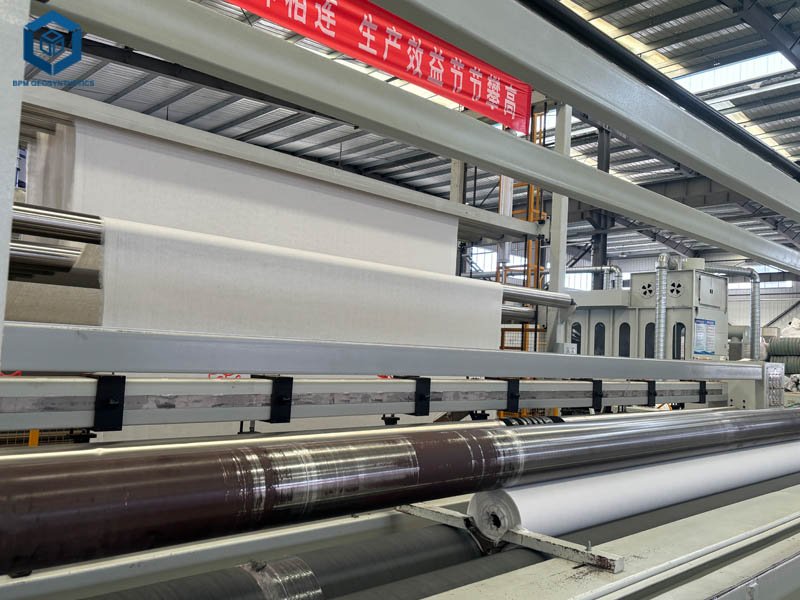
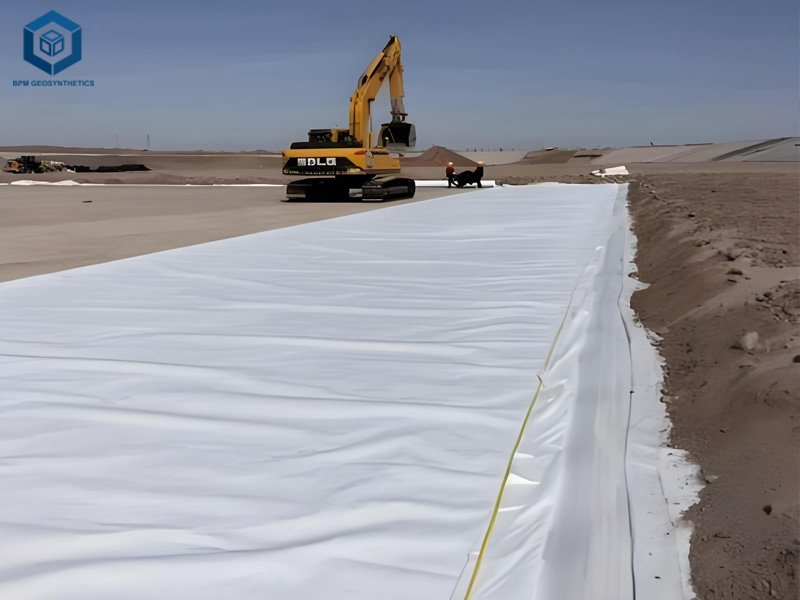
3. How to Choose the Best Geotextile Manufacturers
Selecting the right geotextile manufacturer requires evaluating several factors:
3.1 Application-Specific Requirements
Match geotextile specifications to your project’s needs. BPM’s PP woven geotextiles are ideal for road stabilization, while GEOSINCERE’s knitted geotextiles suit dynamic load applications.
3.2 Material Durability
High-quality polypropylene and polyester, as used by BPM and GEOSINCERE, offer superior UV and chemical resistance, with a lifespan of 15–20 years.
3.3 Certifications and Standards
Choose manufacturers with ISO 9001, ISO 14001, and ASTM compliance, like BPM and GEOSINCERE, to ensure quality and reliability.
3.4 Energy Efficiency and Sustainability
Eco-friendly geotextiles, like those from Thrace Group, reduce environmental impact and support sustainable construction.
3.5 After-Sales Support
Manufacturers with global networks, such as BPM and Agru America, provide timely technical support and installation services.
4. FAQs About Geotextile Manufacturers
What are geotextiles, and what are their primary uses?
Geotextiles are permeable fabrics used to enhance soil stability, provide erosion control, and facilitate drainage in civil engineering projects like roads, landfills, and coastal protection.
How do I choose the right geotextile manufacturer?
Evaluate material quality, certifications, performance specifications, and support. BPM and GEOSINCERE offer cost-effective, certified solutions, while Agru America provides premium options.
What materials are best for geotextiles?
Polypropylene and polyester are ideal for their durability, UV resistance, and chemical stability, offering a lifespan of 15–20 years.
Are Chinese geotextile manufacturers reliable?
Yes, BPM and GEOSINCERE are globally trusted, with ISO certifications and exports to over 80 countries, ensuring high-quality products.
5. Conclusion
Choosing the right geotextile manufacturer is critical for ensuring project success in civil engineering, environmental, and construction applications. The Best Project Material Co., Ltd. (BPM Geosynthetics) leads with innovative, certified geotextiles and a global presence, ideal for road and landfill projects. Shandong GEOSINO New Material Co., Ltd. (GEOSINCERE) offers high-performance, cost-effective solutions for diverse applications. Other leaders like Agru America, Hanes Geo Components, Thrace Group, Global Synthetics, and Ocean Global provide robust options for global markets. By prioritizing material quality, certifications, and support, you can select a manufacturer that meets your needs.
For tailored solutions, contact BPM’s sales team at sales@bpmgeosynthetics.com.

